Killer Coke Update | August 14, 2007
Coca-Cola's Woes Keep Piling Up with Big Losses.
Contents of the Newsletter
- TIAA-CREF says Coca-Cola & its biggest U.S. bottlers not socially responsible
- Coke's Brand Name Value suffers $2 billion loss!
- University of Illinois dumps Coke: Students key to statewide victory
- Banaras Hindu University in India bans Coke poducts
- Camp in Norway dumps Coke
- University of Michigan new Stop Killer Coke Campaign
- Washington Food Co-op dumps Coke's Odwalla juices & snack bars
- Coke's Potter & CEO Isdell stymie ILO Colombia monitoring & investigation
- Coke Slammed at U.S. Social Forum
- Coke Sued by Shareholders for Fraudulent Business Practices
- New Stop Killer Coke Campaign growing in Poland
- Union election victory & strike at Coke
- Environmental Law Research Centre report reaffirms Coke's abuses in India
- Bottled Water vs. Tap Water controversy hits the Media
- Major reports from the campaign that are useful in organizing
- Do you need a customized Campaign leaflet?
- Campaign's 'Campus Activism' Section
- Take Actions Against Coke!
- Please send photos, reports of events, etc. for the Campaign website
- Sponsor Campaign to Stop Killer Coke Director Ray Rogers to speak at your campus, conference or convention
1. TIAA-CREF says Coca-Cola & its biggest U.S. bottlers not socially responsible
All college, university and other school administrators should take note:
TIAA-CREF's (Teachers Insurance & Annuity Association-College Retirement Equities Fund) $9 billion CREF Social Choice Account, the nation's largest socially-screened fund for individual investors, will not allow any investments in either The Coca-Cola Company or its two largest U.S. bottlers, Coca-Cola Enterprises and Coca-Cola Bottling Co. Consolidated because these companies do not meet the criteria established for socially-responsible companies.
All these companies have been dropped from the Broad Market Social Index (BMSI) list of socially-responsible companies prepared by KLD Research & Analytics, Inc. of Boston, MA, an independent investment research firm that is considered a world leader in defining corporate responsibility standards.
"For decades, TIAA-CREF has earned a reputation for combining sound common-sense investment practices with a concern for honesty, integrity and social responsibility on the part of corporate policymakers," said Ray Rogers, director of the Campaign to Stop Killer Coke (www.KillerCoke.org). "It is now clearer than ever before that The Coca-Cola Company and Coke bottlers fail to meet the standards that investors have a right to expect."
In July 2006, when The Coca-Cola Company was dropped from KLD's Broad Market Social Index (BMSI), TIAA-CREF divested 1.25 million shares of stock. The BMSI includes companies within the Russell 3000 Index that perform better than their peers on environmental, social responsibility, corporate governance and human rights matters.
The divestment came after TIAA-CREF's advisor, KLD Research & Analytics, removed Coke from its list of socially responsible companies; the Atlanta Journal-Constitution reported (7/19/06). "KLD based its decisions on a number of issues — labor and human rights in Colombia, environmental issues in India and the marketing of high-calorie drinks to children in the United States."
Coca-Cola Co. senior executives lobbied hard to be reinstated into the BMSI this year, but instead suffered another major setback when its two bottling partners along with The Coca-Cola Co., failed to make the BMSI. As a result, the CREF Social Choice Account divested its CCE holdings and banned any investments in Coca-Cola Enterprises, Coca-Cola Bottling Co. Consolidated and The Coca-Cola Company.
"Such actions by KLD and TIAA-CREF are very serious matters for any company, but especially for one like Coca-Cola that spends billions falsely promoting itself as socially responsible," said Ray Rogers. "Because of Coke's widespread labor, human rights and environmental abuses and fraudulent business practices, the company has, like tobacco, gambling and firearms companies, become a pariah to those concerned with socially responsible investing."
Top executives and board members of The Coca-Cola Co. and Coca-Cola Enterprises are key policymakers of Coca-Cola FEMSA, Coca-Cola's largest bottler in Colombia, and a defendant in lawsuits charging that Coke bottlers in Colombia collaborated with paramilitary thugs who engaged in the systematic intimidation, kidnapping, torture and murder of union leaders.
"While dozens of colleges and universities have become Coke-free in protest of Coke's record of labor and human rights abuses and environmental degradation and the CREF Social Choice Account bans investments in Coke, Coca-Cola's CEO E. Neville Isdell ironically portrays the company as a leader in corporate responsibility to audiences around the world," said Rogers.
2. Coke's Brand Name Value suffers $2 billion loss!
For the second year in a row, Coke, although still the number one global brand "because it is big and everywhere," has lost a large portion of its brand name value. In 2005, its brand name was valued at $67.5 billion; in 2006 it lost 1% of its brand name value, which translates into a $680 million loss. This year, Coke lost 3 percent of its brand name value, about a $1.7 billion loss and a loss of more than $2 billion over the past two years. Only two brands in the top 30, Coke and Intel, had a loss of brand name value last year.
Business Week blames Coke's loss on "consumers' shift from soda in the West." However, Coke is the only beverage company in the top 100 that took a loss. And Pepsi's brand name increased by 2 percent during the same year.
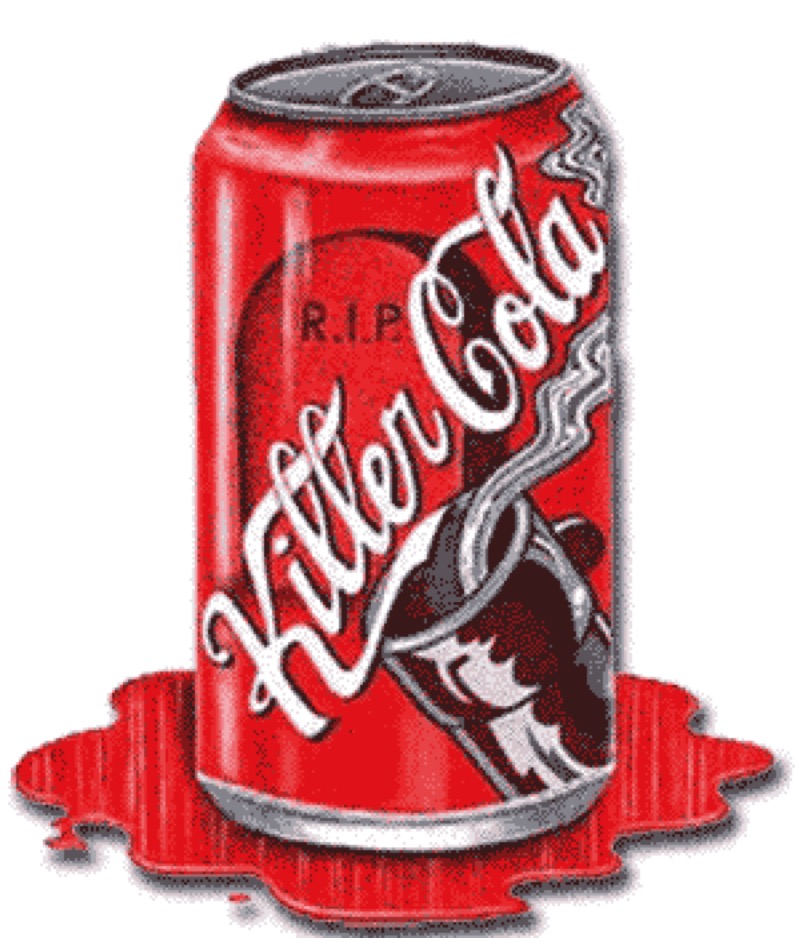
From the beginning of the Campaign to Stop Killer Coke, we've said that two key ingredients of our strategy were to cut off some of Coke's most important markets, such as schools and labor unions, and to pose a threat to Coca-Cola's brand name and its corporate image. From the Olympics to the World Cup games to college and university campuses and union halls worldwide, people are protesting to Stop Killer Coke.
Large institutional investors have told us that Coke's large losses in brand name value is of great concern because it hurts and undermines long-term investments.
Another reason Coke is losing brand name value is because it is no longer considered a socially responsible company. For example, KLD Research & Analytics, Inc., an independent investment research firm that is considered a world leader in defining corporate responsibility standards, excluded Coke from its Broad Market Social Index (BMSI). The BMSI includes only companies within the Russell 3000 Index that perform better than their peers on environmental, social responsibility, corporate governance and human rights matters.
Since The Coca-Cola Co. no longer meets the criteria of a socially responsible company as defined by the BMSI, TIAA-CREF's (Teachers Insurance and Annuity Association - College Retirement Equities Fund) $9 billion CREF Social Choice Account, the world's largest socially screened fund for individual investors, will not allow any investments in The Coca-Cola Co. Last year, when Coke was dropped from BMSI, TIAA-CREF immediately divested 1.25 million shares of stock. Despite heavy lobbying by senior executives of Coca-Cola, Coke was not reinstated this year and, in fact, its two largest bottlers in the United States, Coca-Cola Enterprises and Coca-Cola Bottling Co. Consolidated, were also dropped from the BMSI.
Read July 17, 2007 News Release
Business Week, "Best Global Brands: How five names in this year's rankings staged their turnarounds," By David Kiley, August 6, 2007
Read Article
See Rankings
3. University of Illinois dumps Coke: Students key to statewide victory
Although summer is slow for campuses, a huge victory has just been won at the University of Illinois, Urbana-Champaign, a university of 43,000 students. The student campaign played a large role in influencing a state-wide decision to dump Coke and make Pepsi the beverage in more than 2,300 vending machines on Illinois' state property, including dozens of rest stops, four state universities and several prisons. University of Illinois is but one of some 45 colleges and universities that have kicked Coke off campuses due to widespread labor, human rights and environmental abuses. (Campuses with asterisks on this list have dumped Coke products.))
Coalition Against Coke Contracts, Press Release, "Coca-Cola Kicked Out of University of Illinois," August 6, 2007
Read Press Release
"In another landmark victory for student campaigns against Coca-Cola, the company has been kicked out of the University of Illinois at Urbana-Champaign. U of I is the third university this summer — following Smith College in the U.S. and the Banaras Hindu University in India — to have terminated its beverage contract with Coca-Cola. Coalition Against Coke Contracts (CACC), the group that led the campaign at UIUC, dedicates this victory to the indomitable fighting spirit of communities ravaged by Coke — from Colombia to India. Coca-Cola has been the exclusive beverage provider at the University of Illinois since 1997.
"For the past two years, CACC, a student & community group in Champaign Urbana has forcefully demanded that the University end its business relationship with Coca-Cola in light of the company's egregious records. It has further demanded a public statement from the administration regarding, what has been stated by Chancellor Hermand as "Coca-Cola's recalcitrance" on the afore-mentioned issues. More than 25 local groups joined the coalition, holding numerous dialogs with the administration and organizing public actions. Even as the current contract with Coca-Cola expired on June 30, CACC organized 'the last day of contract' action that involved soda-tasting of a range of locally produced beverages."
The News-Gazette Online, "State [Illinois] Gives Pepsi Pouring Rights," By Christine Des Garennes, August 4, 2007
"For several years, some students and staff on campus have been lobbying university administrators to drop its relationship with the Coca-Cola company due to concerns about alleged anti-union activity at the company's plants in Colombia and alleged water supply and pollution issues in India. The Illinois Student Senate in 2005 passed a resolution asking the university not to renew its agreement with Coca-Cola unless the company invites an independent, third-party to review the allegations. Also in 2005, UI Chancellor Richard Herman wrote a letter to Coca-Cola outlining the concerns raised."
4. Banaras Hindu University in India bans Coke poducts
Banaras Hindu University in Varanasi, India placed a ban on both Coke and Pepsi.
OneWorld South Asia, "Indian university bans soft drinks on campus," August 7, 2007
Read Article
"The soft drinks will not be allowed on Banaras Hindu University (BHU) campus in Varanasi from August 1, 2007. BHU has placed a ban on Coke and Pepsi on campus. This decision was taken by the BHU administration on 1st August."
"Graham here from the Trinity College Killer Coke campaign in Dublin.
"I was invited to a Framfylkingen Camp just outside of Oslo, Norway last week to hold a workshop with the kids there on the Killer Coke campaign. Twenty-five Kids ranging from 8-16 years of age attended. I went over the history of 'Boycotts' (the word was mistaken to mean 'Boys' only), their uses and why the Killer Coke campaign is advocating boycotting coca-cola.
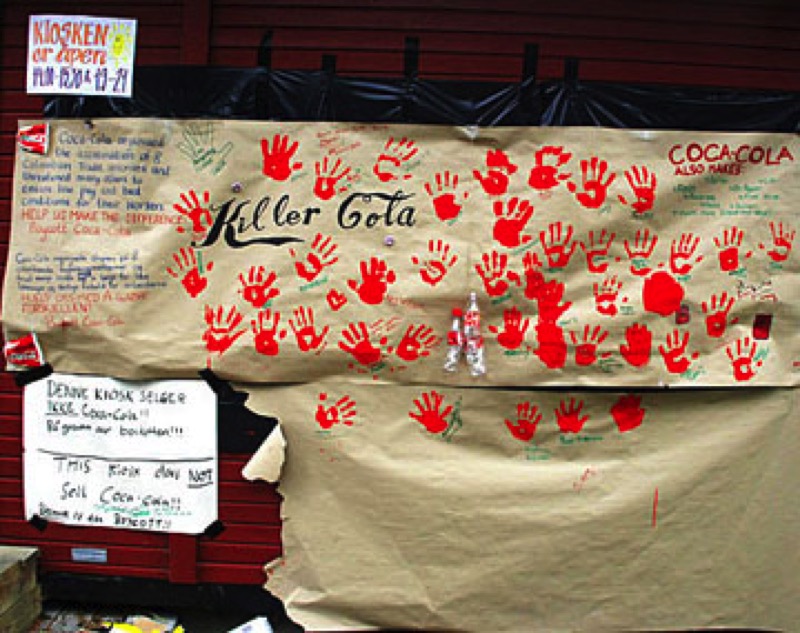
"I was worried about talking in detail about assassinations, torture, kidnapping and violence in Colombia but the kids really connected with the issues. In particular the story about a union leader's son being kidnapped by the paramilitaries connected with them on Child protection issues.
"The kids broke into smaller groups and worked on an Action for the campaign and put together a Hand-paint petition and got the Kiosk on the camp to withdraw its Coke products and not restock Coke for at least the duration of their camp. The small Demo and petition was covered by the Norwegian press with photographers at the camp of 300 Children from the UK, Norway and Finland."
Link to article in Norwegian (Killer Coke info at bottom of article)
6. University of Michigan NEW Stop Killer Coke Campaign
It's been sixteen months since the University of Michigan foolishly announced that Coca-Cola products would be allowed back on campus. That was done after The Coca-Cola Company falsely claimed that the United Nations's International Labor Organisation (ILO) had agreed to do an "independent investigation of past and present labor relations and workers' rights practices of the Coca-Cola bottling operations in Colombia."
The Michigan Daily reported on April 10, 2007 that all deadlines set by the University of Michigan for March 2007 were missed by The Coca-Cola Company. Those deadlines were for assessment of the conditions for Coke workers in Colombia and environmental issues in India. On April 30, 2007, investigation results were to be reported to the university. This could not be done, since no investigation has occurred.
Thus, it should come as no surprise to the University's Chief Financial Officer and Coke cheerleader, Tim Slottow, or to other campus administrators when it was revealed in Australia's Sydney Morning Herald (June 6, 2007) that, at the ILO's annual meeting in Geneva, "Employers led by a Coca-Cola executive [Ed Potter] stopped the International Labour Organisation examining violations of workplace rights in Colombia?"
With respect to India, administrators at the university should read the recently published report by the International Environmental Law Research Centre, headquartered in Geneva, Switzerland, damning Coke's environmental practices in India. (What is the International Environmental Law Research Centre?)
In December 2005, University of Michigan students and a coalition of student organizations were successful in banning all Coke products from campus. (Coke Suffers Another Major Defeat [at U of M])
We feel that it is incredibly important that the Campaign to Stop Killer Coke become increasingly visible on the University of Michigan campus and that administrators are held accountable for the way they have continued to defend and support Coke in light of all the evidence that the university is being used as just another pawn in Coke's efforts at covering up its crimes and other unethical behavior.
We ask that any students, student organizations, faculty members and labor unions on campus willing to help the Campaign wage its battle, contact Campaign to Stop Killer Coke Director Ray Rogers at (718) 852-2808 or by email at info@KillerCoke.org. Please be sure to include your phone number so we can talk to you.
7. Washington Food Co-op dumps Coke's Odwalla juices & snack bars
The Food Co-op in Port Townsend, Washington, has decided to ban Odwalla juices and Odwalla snack bars from its shelves. According to a press release from the Co-op, the boycott decision was due to "Coke's suspected human rights violations and contamination of ecosystems..." - that is, "the intimidation and abuse of unions, which includes the alleged murder of eight Colombian union leaders and the beating of about 100 workers by paramilitary units" and "that Coke is exhausting water reserves in Third World countries such as India, which leaves farmers unable to irrigate their crops and makes it even more difficult for the poor to gain access to safe drinking water."
Be sure to see this beautiful and thorough Why No More Odwalla? page.
Food Co-op, Port Townsend, "Odwalla Pulled from Shelves," by Janet Welch, Board President, and Cindy Wolpin and Julie Jaman, Co-op Member-Owners
Read Food Co-op's Article
"The Food Co-op has made the decision to boycott Odwalla, a subsidiary of the Coca-Cola Corporation. In doing so, the Co-op joins the largest anti-corporate movement since the campaign against Nike for sweatshop abuses. The pressure on Coke is coming from the Campaign to Stop Killer Coke, boycotts at over 130 colleges and universities worldwide, and action from the International Teamsters."
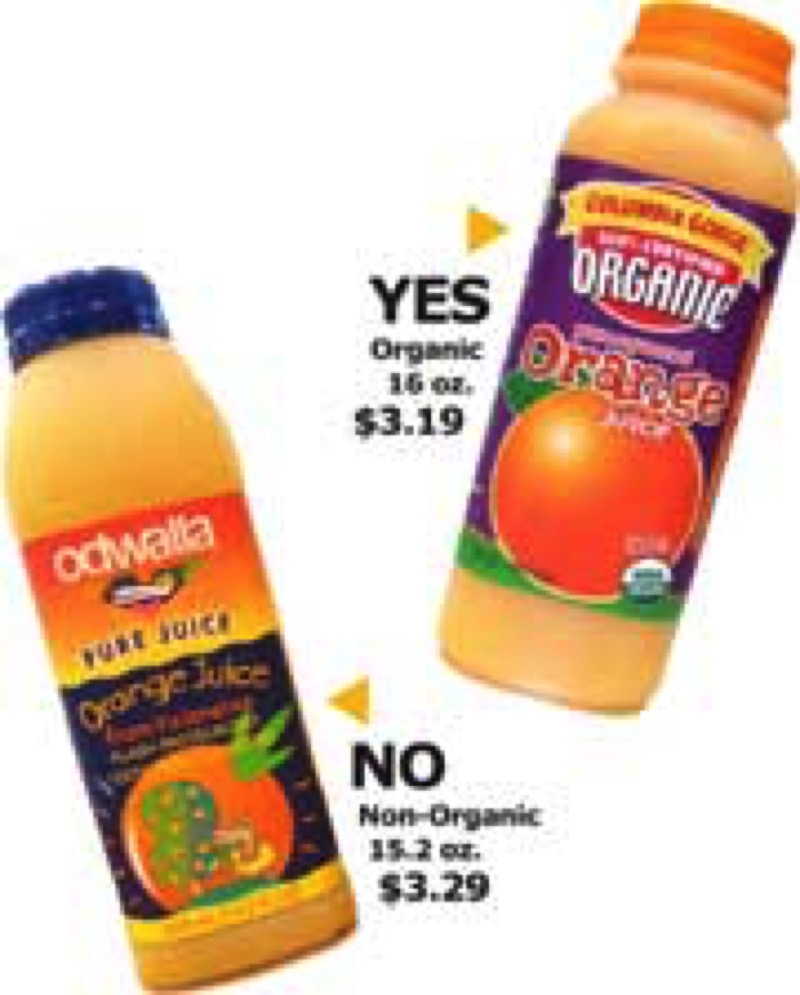
Note that the larger organic juice is cheaper than Coke's Odwalla
Port Townsend & Jefferson County Leader, "Food Co-op boycotts Odwalla as a Coca-Cola product," By Celeste Flint, August 1, 2007
Read Article
"The Food Co-op, spurred by store members, has joined an international boycott of Coca-Cola products and has stopped selling Odwalla juices and snack bars. The Co-op has made about $80,000 annually from Odwalla-related products."
8. Coke's Potter & CEO Isdell stymie ILO Colombia monitoring & investigation
"Employers led by a Coca-Cola executive [Ed Potter] stopped the International Labour Organisation examining violations of workplace rights in Colombia..."
The Sydney Morning Herald, June 6, 2007
It has once again become painfully clear that The Coca-Cola Co. and Ed Potter, Coke's Director of Global Labor Relations, continue to use the International Labor Organization of the United Nations (ILO) to undermine any efforts to hold Coke bottlers in Colombia accountable for widespread labor and human rights abuses, including the systematic intimidation, kidnapping, torture and murder of union leaders. These abuses are highlighted in lawsuits filed against Coca-Cola and its Colombian bottlers in 2001 and 2006.
Through the machinations of Potter, the ILO is being used to serve the interests of Coca-Cola. Rather than working to get an investigation, Ed Potter appears to be working to shield Colombia and Coca-Cola from any real scrutiny at a time when Colombia, President Uribe, and multinational corporations have been under fire for links to paramilitary death squads.
Most recently, The Sydney Morning Herald [June 6, 2007] reported: "Employers led by a Coca-Cola executive [Ed Potter] stopped the International Labour Organisation examining violations of workplace rights in Colombia..."
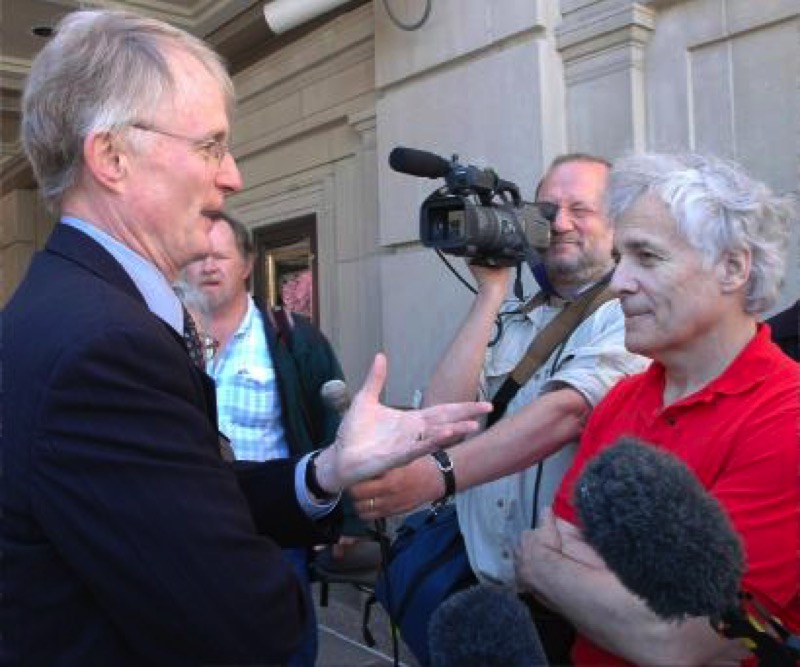
Ed Potter (left), global labor relations director for Coke, talks to Ray Rogers of Corporate Campaign Inc. about Coke labor issues in Colombia, which Rogers raised at the 2006 Coca-Cola shareholders meeting.
The non-profit, non-partisan Center for Media and Democracy wrote on the same day: "After the International Labour Organisation included Australia on a list of 25 countries of concern for their labour standards, the Australian government lashed out. The Minister for Workplace Relations, Joe Hockey, claimed that the Australian Council of Trade Unions (ACTU) had lobbied to have Australia included at the expense of listing Colombia, where many labor officials have been assassinated.
"However, the ACTU's international officer, Alison Tate, said that while the international unions had Colombia at the top of their list, it was effectively vetoed by the representatives from the International Organisation of Employers (IOE). Tate told The Sydney Morning Herald that the IOE representative in the negotiations was The Coca-Cola Company's Director of Global Labour relations, Ed Potter..."
Since March 2006, The Coca-Cola Co., its CEO Neville Isdell and Ed Potter have repeatedly lied about the ILO commitment to do an investigation of Coke's past and present labor practices in Colombia in order to shed light on allegations of widespread human rights abuses by its bottlers. They have claimed that the ILO is doing an "investigation of past and present labor relations and workers' rights practices of the Coca-Cola bottling operations in Colombia." However, ILO officials have completely contradicted Coke's assertions that it is doing such an investigation.
At the Coca-Cola shareholders meeting in April 2006, Isdell responded to a question asked by Campaign to Stop Killer Coke Director Ray Rogers regarding ILO officials' contradictions of Coke's claims: "We have a document from the ILO, signed by the ILO," Isdell replied, "committing themselves to do exactly what you said...We have a document. We have an agreement, and they are going to investigate past and prior practices."
On April 10, 2006, then-President of Coca-Cola North America Donald Knauss wrote a letter to University of Michigan Executive Vice President a & CFO Tim Slottow, in which he said: "...the IUF announced that it requested the International Labor Organization to investigate and evaluate past and present labor relations and workers' rights practices of the Coca-Cola bottling operations in Colombia...Our Company supports the IUF in this effort and, in fact, sent our own request for an investigation to the ILO...On March 24 [2006], the ILO agreed to conduct the investigation and evaluation and is beginning the process of finalizing its scope, protocol and timing."
Within one day of receiving this letter from Coke, Slottow decided to bring Coke products back to the campus in spite of a strong campaign by a coalition of student groups that was successful in getting the University of Michigan to dump Coke.
On April 10, 2007, the Michigan Daily reported that all the deadlines set by the University of Michigan for March 2007 were missed by The Coca-Cola Co. Those deadlines were for assessments of the conditions for Coke workers in Colombia and environmental issues in India.
On April 30, 2007, investigation results were to be reported to the university. This could not be done, since no investigation has occurred.
Even if the ILO were doing an investigation into Coke's past and present labor practices in Colombia, it could not be considered unbiased. Ed Potter is himself a member of the ILO's Applications of Conventions and Recommendations Committee. For many years, he has been and currently acts as the head spokesperson for the entire Employers' Group, a powerful role within the ILO structure that allows him to promote the interests of big business and Coca-Cola, in particular.
It should be noted that Potter was involved earlier, in 2005, in the creation of a "Commission" consisting of representatives of major universities and prominent worker rights advocacy organizations that were trying to develop a methodology for evaluating how or whether Coca-Cola's Colombian bottlers worked with paramilitary death squads. When the commission asserted its independence by kicking Mr. Potter out, so it could then be truly independent, Coca-Cola began backing away from and creating reasons to delay and obstruct any meaningful investigation.
Finally, Mr. Potter insisted that Coke couldn't participate at all in an investigation process unless the attorneys who sued the company agreed that any evidence of Coke's abuses could not be used in their lawsuits. The lawyers refused this demand since compliance would require them to violate the rules of legal ethics, something Mr. Potter knew. Whether such a demand by Coke indicates its guilt is a legitimate question.
The so-called ILO investigation still hasn't occurred. If the ILO ever does anything, it will be exactly what Coca-Cola and Potter wanted all along: a blatantly biased evaluation that will ignore past abuses and will not hold the company accountable in any meaningful way.
Any comments or questions, email: info@KillerCoke.org or call: (718) 852-2808.
9. Coke Slammed at U.S. Social Forum
Under the intense heat of the sun on Wednesday, June 27, in Atlanta Georgia, thousands of activists walked determinedly to the beat of change in the Opening March of the first-ever U.S. Social Forum.
As they started their march from the Georgia State Capitol, carrying banners and signs calling for anything from economic human rights to the end of the Iraq War, Campaign to Stop Killer Coke Director Ray Rogers and I were taking a stand of our own, quite literally. Claiming a patch of sidewalk alongside the route of the march, Mr. Rogers and I stood firm against Coca-Cola, holding up a banner that those marching by read: "KillerCoke - Unthinkable! Undrinkable!"
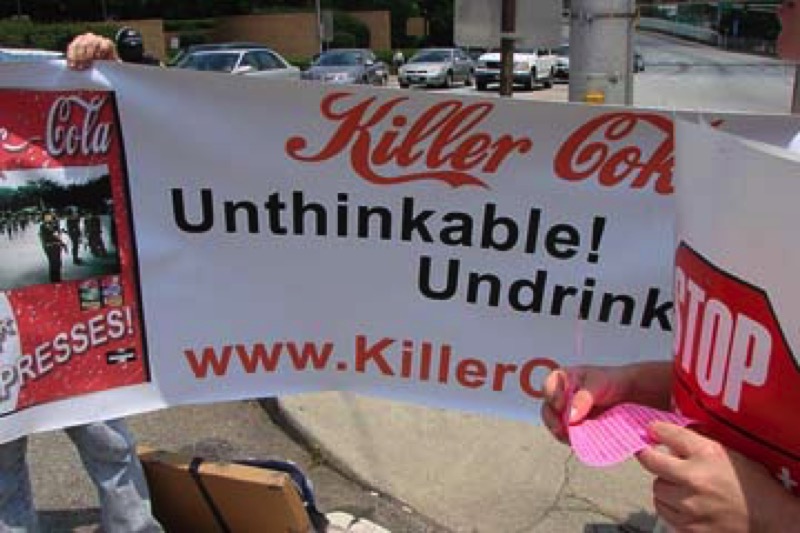
Though not everyone was familiar with the KillerCoke Campaign, most of the onlookers shouted: "Yes! Stop KillerCoke!" while many took pictures. The Campaign has been responsible for more than 200 colleges and universities worldwide actively campaigning to ban Coke from their campuses and more than 40 having cut contracts with the colossal, corrupt multi-national corporation accused of complicity in the killing of union leaders in Colombia,
After all the groups had passed, we joined the march and handed out hundreds of leaflets and posters in a matter of hours. Unannounced, and not yet registered for the forum, the Campaign to Stop KillerCoke was set to take the U.S. Social Forum by storm.
On Thursday morning Gerardo Cajamarca, a union leader from Colombia, facilitated a workshop on KillerCoke's human and labor rights abuses. The rest of the day was dedicated to recruiting supporters to help distribute literature at various workshops, on the streets in between workshops, and at the Civic Center before and during the evening's plenary discussions. There was even a small (three USAS members and me) impromptu anti-Coca-Cola march down Park Street at the end of the Civic Center.
By the end of the day, it seemed that mostly everyone we ran into had heard, one way or another, of the campaign. Still, there were those who hadn't and those who had not yet made their way to the forum. More people-to the tune of thousands-were expected to show up before the week was over. Over a thousand leaflets were handed out that day, but more work lay ahead of us, and despite an unexpected early-evening summer thunderstorm that threatened to drench us on our way back to our hotels after a tiring day of outreach, we managed to get back to our rooms dry and ready for the next day-the big day.
United Students Against Sweatshops (USAS) and the Campaign to Stop KillerCoke joined the march of the Poor People's Economic Human Rights Campaign (PPEHRC) that began at the Martin Luther King Center for Nonviolent Social Change, stopped at a local Burger King (where we protested briefly for fair wages) and finally made its way to the headquarters of Coca-Cola two miles away. With the sun beating down on two hundred of us and the march route taking us uphill, keeping everyone safe and hydrated became a major issue. A large brigade of Atlanta police on motorcycles cleared the way for the march.
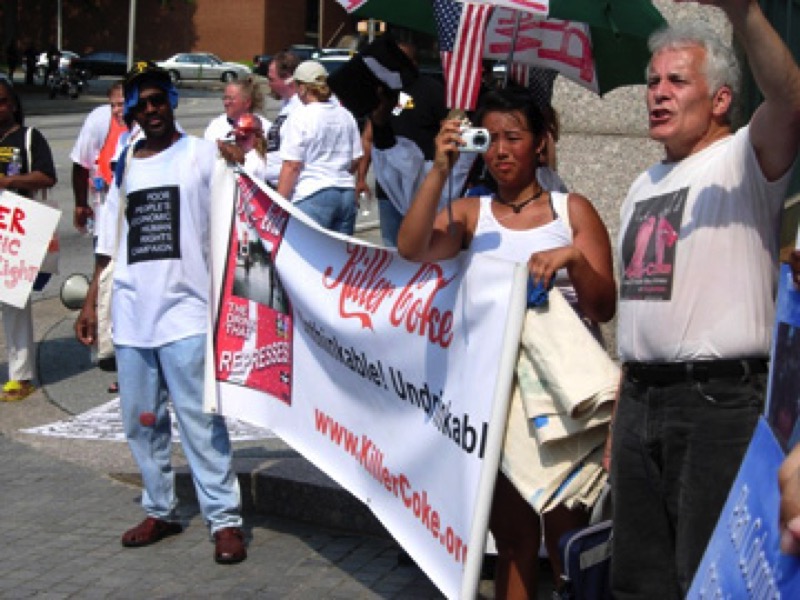
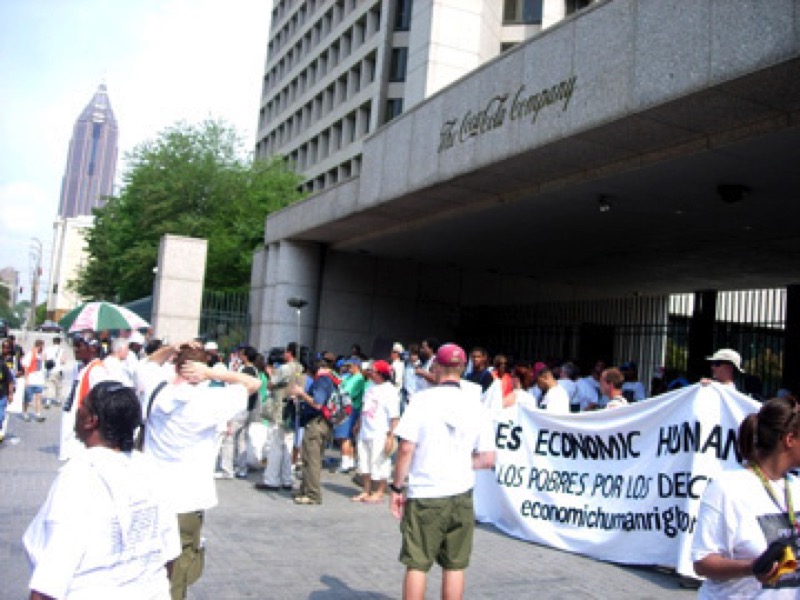
As the tap water from people's reusable bottles ran out, we turned to bottled water provided by the march's organizers and distributed by USSF volunteers, who also passed out towels and did a great job keeping us in formation. The water, needless to say, was not bottled by Coca-Cola, which is also facing opposition for depleting water tables in communities across India, Mexico, and Bolivia while polluting remaining water sources.
While USSF volunteers worked to keep us safe, march organizers worked even harder to keep our energies high. Holding up KillerCoke posters that read, "Killer Coke: The Drink that Represess," "Ice Cold," depicting the feet of a murdered union leader and chanting catchy phrases such as "Cherry, Diet, and Vanilla; Coca-Cola is a Killa!", "Coca-Cola, Asesina!" and "Hey, hey. Ho, ho. Coca-Cola's got to go!" we pushed on.
As we neared the Coca-Cola headquarters, a wave of renewed energy swelled in us like a welcomed breeze. Straightening our backs and lifting the volume of our chants, we approached the closed and guarded iron gates of the grand building, demanding "Justice now!" Filing in under the concrete awning sheltering the entrance, we listened to a representative from the PPEHRC speak, followed by Gerardo Cajamarca (Camilo Romero of USAS translated), and Ray Rogers, who asked us to see Coca-Cola for what it really is-a greedy corporation that puts profits before human dignity and life. At the end of the demonstration, protestors threw dozens of signs through the metal bars of the gates to deliver their own direct message to Coca-Cola.
The theme of exposing Coca-Cola for the reality of its crimes was echoed the very next morning on Saturday at the last anti-Coca-Cola demonstration of the US Social Forum. This time, organized by the India Resource Center, a small but vocal gathering of 50 or so individuals from various groups including USAS, the Ruckus Project, and the Campaign to Stop KillerCoke orchestrated a die-in in front of the newly opened World of Coca-Cola Museum. As visitors to the museum looked on, protestors chalked the bodies of the dozen or so individuals participating in the die-in.
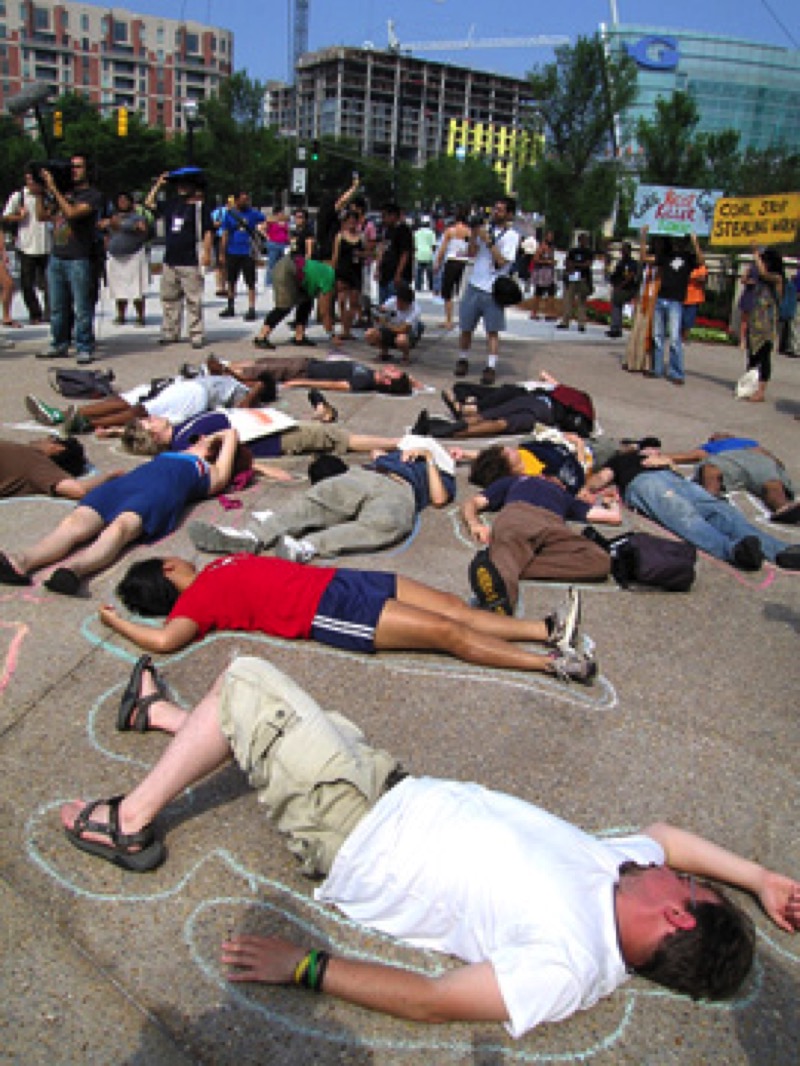
Standing opposite an impressive, large, floating banner pulled by two large, red balloons, Amit Srivastava, the director of India Resource Center and local farmers from India informed the crowd about Coca-Cola's environmental abuses and the grassroots movement to kick Coca-Cola out of Indian communities. After fifteen minutes of speeches and chants including, "Coca-Cola, Go Back! Go Back!" and "Move! Get out of the way! Coca-Cola, get out of the way!", the "dead" rose up to write messages to Coca-Cola demanding justice inside the chalk outlines.
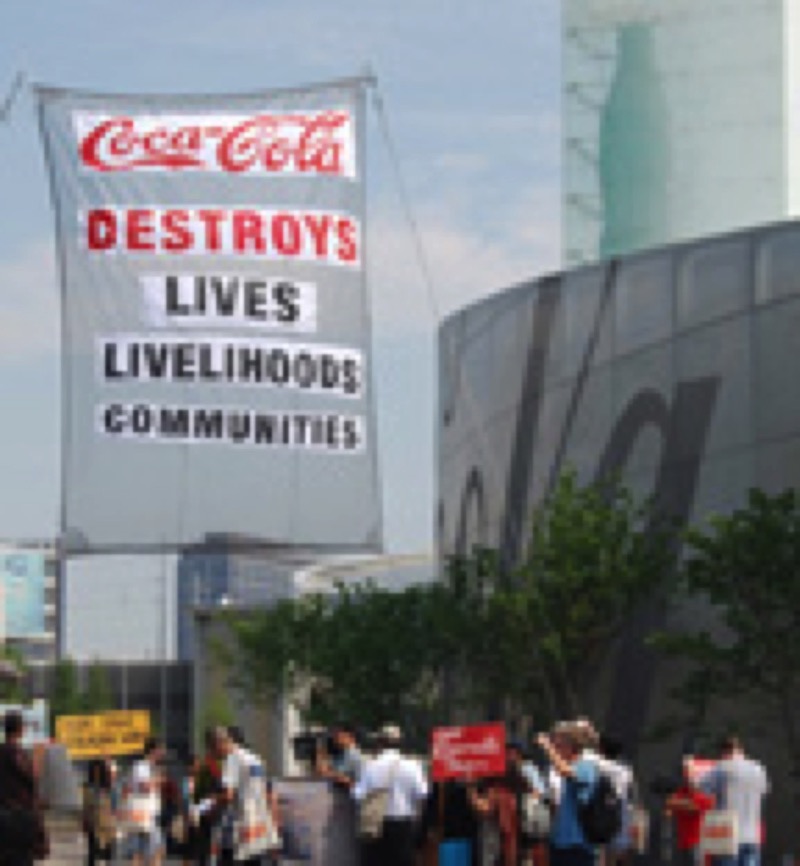
Then the group marched a few yards towards the museum shouting, "This is the real Coca-Cola," pointing to a large poster showing women in India marching against the corporate criminal. The picture was being offered to Coca-Cola to include in their museum. Not to anyone's surprise, Coca-Cola refused to provide a representative to take the picture, which was left on the ground. As the protestors left the scene, having soiled the image of Coca-Cola in the eyes of unsuspecting visitors entering the museum, security guards were already fencing the area around the chalkings-no doubt getting ready to wash away any evidence of Coca-Cola's crimes.
We cannot expect anything less from one of the most socially irresponsible and quite frankly, lethal, corporate giants. We can only guess the reason for the lack of local media coverage of the Coca-Cola demonstrations or the U.S. Social Forum. This historical event included two anti-Coca-Coca protests and offered numerous workshops about Coca-Cola's wrongdoings in both India and Colombia, the struggle against corporate control and privatization of water, and labor rights. However, despite Coca-Cola's efforts to keep its human rights, labor, and environmental abuses out of the public eye, the Campaign to Stop KillerCoke, along with other groups working in solidarity for a better world, was able to deliver a huge and symbolic blow to the very heart of Coca-Cola, right in its hometown of Atlanta. With over two thousand leaflets and hundreds of posters distributed and, more importantly, countless people made aware of the campaign, it is only a matter of time before KillerCoke is forced to clean up its act.
The theme of the watershed U.S. Social Forum was "Another World is Possible. Another U.S. is Necessary." Building on the work of student activists worldwide and the work we accomplished during the Social Forum with friends and supporters working towards similar goals of human rights-to unionize, to water, to life-it is clear to me that another world is possible, one in which humanity and solidarity and not money makes the world go round.
A report from Hnin W. Hnin, Williams College
10. Coke Sued by Shareholders for Fraudulent Business Practices
Coke shareholders are suing the company charging that the practice of channel stuffing has cost investors $1.3 billion in damages. "Channel stuffing is the business practice where a company, or a sales force within a company, inflates its sales figures by forcing more products through a distribution channel than the channel is capable of selling to the world at large. Also known as "trade loading", this can be the result of a company attempting to inflate its sales figures." (from Wikipedia.org)
Law.com, "Plaintiffs' Expert: Coke Cost Investors $1.3 Billion — Shareholders say damages resulted from 'channel stuffing' to inflate Stock prices artificially," By R. Robin McDonald, July 2, 2007
Read article in Law.com
"Coca-Cola Co. shareholders sustained damages exceeding $1.3 billion after the international soft drink conglomerate improperly inflated revenues to boost stock prices artificially, a financial expert retained by suing shareholders has concluded."
Read article in Daily Report
"Shareholders say damages resulted from 'channel stuffing' to inflate stock prices artificially."
11. New Stop Killer Coke Campaign growing in Poland

Click here for the Polish site
12. Union election victory & strike at Coke
In the past month, labor unions have taken on Coca-Cola Enterprises (CCE), The Coca-Cola Company's largest bottler. Two of CCE's board members are also on the board of Coca-Cola FEMSA, the largest Colombian bottler, which is a defendant in the human rights abuse lawsuits charging systematic intimidation, kidnapping, torture, and murder of union leaders.
In Oceanside, California (Southern California) the majority of employees chose the Teamsters Union as their bargaining representative in an election. This plant was opened earlier this year as a non-union one. The Teamsters held rallies at numerous events and venues that are connected to Coke.
In England, workers at the UK's biggest bottling and distribution center struck for 48 hours after turning down a 2.5 percent offer."
EarthTimes.org, "Coca-Cola Workers in Oceanside Choose Teamsters Union," Press Release, Teamsters Local 683, August 3, 2007
Read Press Release
"Earlier this year, Teamsters in Southern California, Texas, Ohio, Atlanta and other cities protested Coke's opening of the formerly non-union Oceanside plant by rallying at numerous sporting events sponsored by Coca-Cola and its subsidiary brands. These rallies culminated in an historic rally in New York's Times Square, near Coke's giant video screen. Hundreds of Teamsters from across the country, as well as union leaders from Coke's overseas operations spoke at the rally."
Sky News, "Workers Take The Fizz Out Of Coke," July 26, 2007
Read Article
"Workers at Coca-Cola's biggest UK bottling and distribution centre have gone on strike for 48 hours. Unions say the strike will have a "devastating effect" on supplies. Members of the Unite union based at the West Yorkshire site of Wakefield stopped work after turning down a 2.5% pay offer."
13. Environmental Law Research Centre report reaffirms Coke's abuses in India International Environmental Law Research Centre, "Legal Implications of Plachimada: A Case Study," By Sujith Koonan, May 2007
Read Report
"The deterioration of groundwater in quality and quantity and the consequential public health problems and the destruction of the agricultural economy are the main problems identified in Plachimada. The activity of the Coca Cola company has caused or contributed a great deal to these problems. The people living in the vicinity of the Company have been suffering these problems for the last few years. The availability of good quality water for drinking purposes and agriculture has been affected dangerously due to the activity of the Company. Apart from that, the Company had also polluted the agricultural lands by depositing the hazardous wastes. All these point to the gross violation of the basic human rights, that is, the right to life, right to livelihood and the violation of the pollution control laws."
14. Bottled Water vs. Tap Water controversy hits the Media
In the years that we, along with our allies, have taken on the bottled water industry, the issue has increasingly become a major one in the mass media. On August 1, 2007, The New York Times published an editorial, "In Praise of Tap Water," emphasizing the high cost of bottled water, financially and environmentally. Two days later, on August 3, the International Bottled Water Assn. placed a full-page ad in The New York Times and the San Francisco Chronicle. Reading between the lines, the ad is very critical of the beverage industry for selling chemically-laden sugar water: "Diabetes. Obesity. Heart disease," the ad states. "America's declining health is in the headlines every day. At a time when one of the greatest challenges facing this country is the health of its people, it's time to think about water. Calorie-free, refreshing water. Whether it comes from a faucet or a bottle, drinking water is an easy step people can take to lead a healthier lifestyle."
This Sunday, August 12, The New York Times published an article in their Sunday Styles section, entitled: "Water, Water Everywhere, But Guilt by the Bottleful." In the article, it is stated: "In the last few months, bottled water - generally considered a benign, even beneficial, product - has been increasingly portrayed as an environmental villain by city leaders, activist groups and the media. The argument centers not on water, but oil. It takes 1.5 million barrels a year just to make the plastic water bottles Americans use, according to the Earth Policy Institute in Washington, plus countless barrels to transport it from as far as Fiji and refrigerate it."
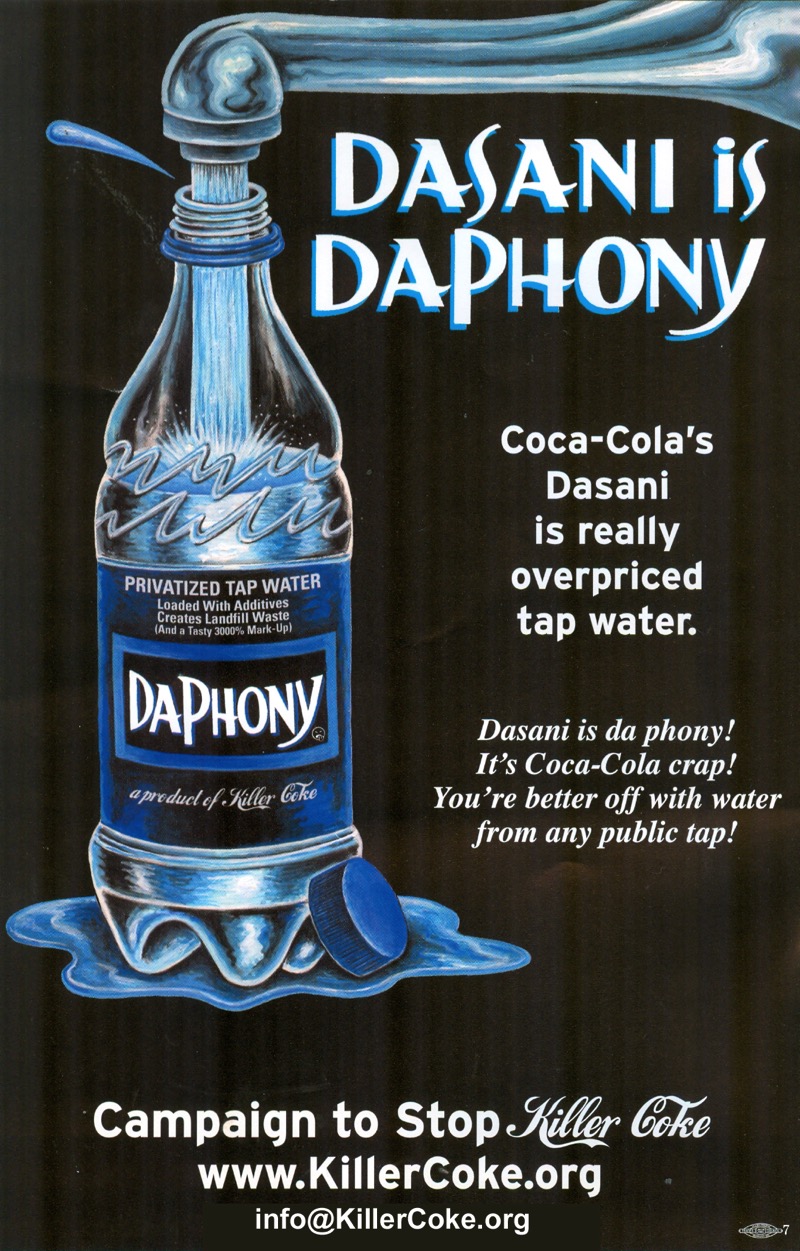
Only last month, both CNN and MSNBC televised segments indicating that tap water was perhaps better and safer than bottled water and each emphasized the environmental danger of bottled water. In addition, "60 Minutes" presented a segment on bottled water and the host of the show referred to the Penn & Teller piece to which we link below. In that video, a waiter at a fancy restaurant fills expensive-looking bottles with tap water from a garden hose. Customers are encouraged to buy the water for as much as $6.00 a bottle. The customers sip the water as though they were drinking fine wine and comment: "This tastes very crisp!" Very few consumers of bottled water can tell the difference in a blind test as has been the case at numerous colleges and universities.
Bottled water is under attack in some of the largest municipalities in the United States as well as in Canada and England. The cities of San Francisco and Salt Lake City have already banned bottled water from their city departments. New York City's government is publicizing the importance of using tap water. The mayor of San Francisco in announcing the City's ban issued a statement citing the environmental impact of making, transporting and disposing of the bottles. "More than a billion of them end up in the state's landfills each year." In addition, some of the top restaurants in California no longer promote bottled water to their customers.
The New York Times, "Water, Water Everywhere, but Guilt by the Bottleful," By Alex Williams, Aug. 12, 2007
Read Article
The New York Times, "In Praise of Tap Water," Editorial, Aug. 1, 2007
Read Editorial
"...if you choose to get your recommended eight glasses a day from bottled water, you could spend up to $1,400 annually. The same amount of tap water would cost about 49 cents...The more the wealthy opt out of drinking tap water, the less political support there will be for investing in maintaining America's public water supply. That would be a serious loss. Access to cheap, clean water is basic to the nation's health."
Jim Hightower, "Why Not Drink 'Local?'," June 29, 2007
Read/Listen to Commentary
"In a triumph of marketing over reasoning, the bottled water industry has turned us into conspicuously silly consumers. Controlled by a handful of global conglomerates (such as Coca Cola and Nestle), the water industry has created the fantasy that if it's in a bottle, it's purer than what comes out of the tap."
National Resources Defense Council, "Bottled Water: Pure Drink or Pure Hype?"
Read Report
Read Executive Summary
Read Petition to FDA
"This is the online version of NRDC's March 1999 petition to the FDA and attached report on the results of our four-year study of the bottled water industry, including its bacterial and chemical contamination problems. The petition and report find major gaps in bottled water regulation and conclude that bottled water is not necessarily safer than tap water..."
Newsday, "[New York] City seeks to pull plug on bottled water," By Justin Rocket Silverman, July 13, 2007 [This article is no longer online.]
" 'We don't look at it as losing money, we look at is as investing in the world,' said Del Posto co-owner Joe Bastianich, who said the restaurant will make and sell its own mineral water on site using tap water...[Emily Lloyd, commissioner of the city Department of Environmental Protection] said she understands that New York is a 'grab and go city,' But the hope is that once residents get used to drinking tap water, they will carry a reusable water bottle."
MSNBC (Associated Press), "S.F. mayor bans bottled water at city offices: Global warming and saving taxpayer money cited as reasons," June 25, 2007
Read Article
"[Mayor Gavin] Newsom has issued an executive order banning city departments from buying bottled water, even for water coolers. In a press release announcing the decision, the mayor cited the environmental impact of making, transporting and disposing of the bottles. More than a billion of them end up in the state's landfills each year, the release said."
Corporate Accountability International, "U.S. Mayors Pass Resolution Calling for Support of Municipal Water, Study of Bottled Water," U.S. Conference of Mayors
Read about the Mayors' Conference
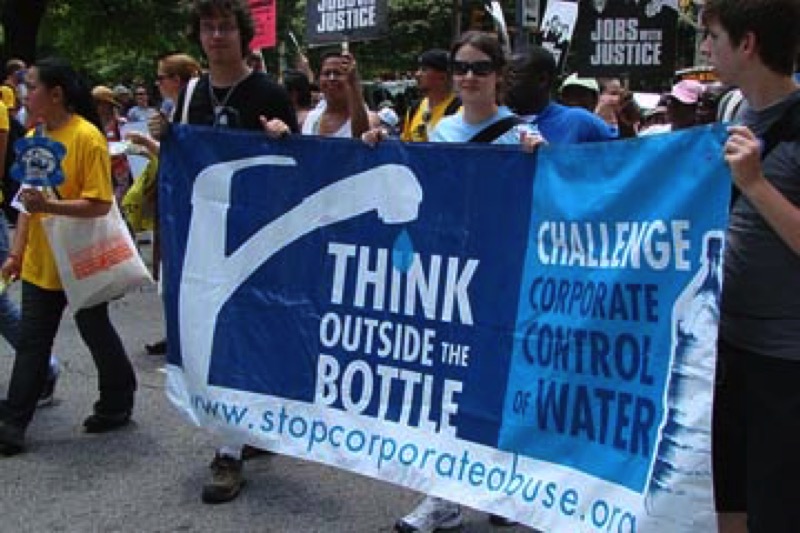
CNNMoney.com, "Bottled water: No longer cool?: Activists turn up the heat on Coca-Cola, PepsiCo and Nestle, says Fortune's Marc Gunther," By Marc Gunther, April 25 2007
Read Article
"Gina Solomon, a physician and senior scientist with the Natural Resources Defense Council, who oversaw the group's 1999 study, uses a low-cost filter at home and a reusable bottle of tap water. 'People complain about the cost of gasoline,' Solomon says. 'No one seems to realize that they are paying for a picture of pretty mountains on the label and a product they could get for free from their own tap.'
"Salt Lake City's outspoken mayor, Rocky Anderson asked city officials to stop handing out bottled water at meetings. 'The environmental impacts surrounding the production, shipment and disposal of bottled water do not fit within the city's goal to conduct itself in an environmentally sustainable way,' Anderson wrote.
"A handful of high-end restaurants - including Chez Panisse in Berkeley, the home of celebrity chef Alice Waters - have stopped serving bottled water."
Life Style Extra, UK News, "Brits 'Should Go Green By Drinking Tap Water'," July 13, 2006
Read Article
" 'Most containers for bottled water are made from non-degradable plastics, which take a 450 years to break down when disposed of in landfill sites. Even glass bottles of water still take a lot of energy to crush and recycle, whereas all we do with a restaurant glass of water is wash it up afterwards.' "
Penn & Teller, "The Truth About Bottled Water," June 30, 2007
Watch Video
"The craze of bottled water is a national obsession but tap water is usually safer for you, and often better tasting too. Using a hidden camera, Penn & Teller will take a look at the obsession."
Newsweek MSNBC, "Environment: A Good Drink at the Sink," July 2-9, 2007
Read Article and See Video
"Nothing irks Salt Lake City Mayor Ross (Rocky) Anderson more than seeing people tote water in plastic bottles. In fact, he argues, his city has some of the best tap water in the country. Several months ago, Anderson instructed department heads to stop buying bottled water for the city's 2,200 workers and provide coolers and fountains instead. 'For a long time, I've viewed [bottled water] as a huge marketing scam,' he says."
In addition, ABC News ran a story as a part of their Caffeine Nation series: "Are you addicted to Diet Soda?" The piece stated that a "new study suggests too much diet soda could mean health risks."
ABC News, "Caffeine Nation: Are You Addicted to Diet Soda?"
Read Article
15. Major reports from the campaign that are useful in organizing
Critical Talking Points from the Campaign to Stop Killer Coke
Read the Critical Talking Points on Killer Coke
LABOR AND HUMAN RIGHTS: 'The Real Thing' in Colombia, By Lesley Gill
Read Report
Colombia Solidarity Campaign, "The Anti-Coke Manifesto," By Andy Higginbottom, Secretary, Colombia Solidarity Campaign
Read Manifesto
Read Manifesto in Italian
"Inside the Real Thing: Corporate profile on Coca-Cola Corporation," Report by the Polaris Institute (Canada)
Read the report in pdf format
NYC fact-finding delegation's report on human rights violations by Coke - Final Report, NYC Council Member Hiram Monserrate, April 2004
View Full Report in pdf - html
View Appendices
War on Want, Press Release and Report, "Coca-Cola under fire as World Cup comes to London, Released March 20, 2006
Read Release
Read Report, "Coca-Cola: The Alternative Report"
En Español
Seven Points to Settlement
Read the Seven Points.
"ILRF Director Terry Collingsworth Response to Coke's Denials," July 8, 2004
Read Response
"University of Michigan Falls Prey to Another Coca-Cola PR Scam," Campaign to Stop Killer Coke
April 17, 2006 Press Release/Report
WB11, New York Feature on the Campaign to Stop Killer Coke
On July 11, 2005, WB11, one of New York City area's major television stations aired a special "Fact Finders Report" on the Campaign to Stop Killer Coke called "Coca-Cola Faces Human Rights Violations." Interviewed are Campaign Director Ray Rogers, Hofstra University Campaign Activist Vanessa Cudabac, New York City Council Member Hiram Monserrate, New York City Comptroller William Thompson and American Postal Workers Union (APWU) Secretary-Treasurer Terry Stapleton. This excellent feature was watched by millions on WB11 and, as we found out from supporters, watched by others around the world on satellite television.
Play Tape of Show
The Campaign's Response to Coke's Statements on the WB11 Feature
Read Response
Video, "State of the Union," produced by Insight News for Channel 4 of Great Britain.
Watch State of the Union
16. Do you need a customized Campaign leaflet?
When we invited supporters to contact us to "customize a leaflet for your campus, union or group," the response was terrific! We immediately began getting emails asking us to produce customized leaflets for numerous colleges, universities, high schools and middle schools. We put them up as soon as we could. We have leaflets for Australia, Canada, Colombia (in Spanish), India, Ireland, Japan, the UK and the US.
Because the demand for flyers was so strong, it took up too much server space. We decided to leave the list online with the schools listed for which we have customized flyers. If you need a copy of your flyer, please contact us and we'll email it to you as soon as possible.
Look to see if your customized flyer is listed.
If your school, union or group is not listed and you would like a customized leaflet, please contact us at info@KillerCoke.org. Please state the name of your school and the name of the sponsoring group, if any, and a local email address, if you want us to put them into the flyer. If you want the flyer for a group, please state the name of the group and an email address. Also, whenever you email the Campaign to Stop Killer Coke, please include a phone number, if possible, in case we have a need to talk with you.
17. Campaign's 'Campus Activism' Section
Many students interested in launching a Campaign to Stop Killer Coke at their schools and colleges have been contacting us. We recommend that students begin by checking out the two organizing packets in our "Campus Activism" section:
- "Unthinkable! Undrinkable! A Campus Campaign Overview," a USAS Campus Guide
- Campus Activism Packet — Campaign for a Coca-Cola Free Campus
- Schools Active in the Campaign to Stop Killer Coke
In addition, there are numerous reports, resolutions and articles in the "Campus Activism" section that can be useful.
18. Take Actions Against Coke!
- Send an e-mail to Coke to protest their abuses in Colombia
- Call Coca-Cola and tell them to stop their worldwide abuses at 1-800-GET-COKE.
- Sign a Petition protesting Coke's abuses
- Join the Boycott at Karmabanque's web site at: www.karmabanque.com
- Send an E-Card to Coca-Cola
19. Please send photos, reports of events, etc. for the Campaign website
Please send photos, reports of events, and if you are in a school, union or organization that has banned Coke products, please send us the resolution or a description of how the decision was made. We would like the Campaign website to be up-to-date and to share the information via our newsletter. (Whenever you email us, please include your phone number and the best times to contact you, including weekends.)
20. Sponsor Campaign to Stop Killer Coke Director Ray Rogers to speak at your campus, conference or convention
You can help build your campaign while helping to finance the Campaign to Stop Killer Coke by sponsoring Director Ray Rogers to speak at your campus, conference or convention. Ray is also the founder of Corporate Campaign, Inc., which has a long history of labor, human rights and environmental activism. Ray has appeared frequently in media outlets worldwide. In 2006, Business Week described Ray as a "legendary union activist" and Time magazine wrote in the '80s that Ray has "brought some of the most powerful corporations to their knees, and his ideas are spreading."
The Nation, in a May 1, 2006 article on the Campaign, stated: "The Coke campaign has grown into the largest anticorporate movement since the campaign against Nike for sweatshop abuses." Ray helps finance the Campaign through speaking fees. He has spoken about the Campaign at campuses throughout the United States, Canada and Europe. He is also available to meet with student organizations, student government leaders and campus administrators. Contact Campaign to Stop Killer Coke at (718) 852-2808 or by email at info@KillerCoke.org. Please be sure to include your phone number so we can talk to you.
Learn the truth about The Coca-Cola Co.
"We believe the evidence shows that Coca-Cola and its corporate network are rife with immorality, corruption and complicity in murder."
Campaign to Stop Killer Coke/Corporate Campaign, Inc. Director Ray Rogers











